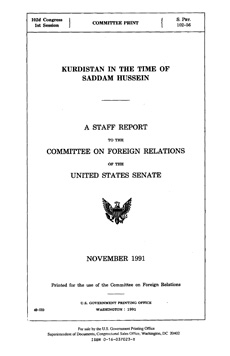|
LETTER OF TRANSMITTAL
November 26, 1991
The Honorable Claiborne Pell,
Chairman, Committee on Foreign Relations,
U.S. Senate, Washington, DC 20510
Dear Mr. Chairman: Six months ago the fate of Iraq's Kurds was placed on the international agenda as a result of the immense human suffering following the failure of their rebellion against Saddam Hussein. International intervention helped prevent a greater catastrophe, but the people of Iraqi Kurdistan remain at grave risk. At your direction, I returned to Iraqi Kurdistan in September to assess the situation.
Between September 4 and 11, 1991, I traveled throughout the Kurdish-controlled parts of Iraq. The liberated territory now comprises more than 80 percent of the Kurdish inhabited lands, and I went as far south as Halabja, as far east as Haj Omran on the Iranian border, north to the triangle where the borders of Iran and Turkey converge, and, in the west, to Amadiyah, Dihok, and Zakho where the Syrian and Turkish borders meet. Four times I crossed Iraqi lines, on two occasions disguised as a Kurd, in order to visit the populous cities of Irbil and Sulaymaniyah. This report attempts to present as comprehensive a picture of the situation in Kurdistan today as possible.
This trip would not have been possible without the assistance, cooperation, and friendship of many of the Iraqi Kurds including my host Jalal Talabani, KDP leader Massoud Barzani, Samy Abdu Rahman, Hoshyer Zebari, Karim Khan of Bardohst, and Sheikh Moustafa Zinawi. Dr. Abdul Karim Rauf, who escorted me safely through Kurdistan during the March uprising, and Hoshyer Samsan were my guides in Kurdistan, and I am grateful to thern as well as to Tania Ali Hasan and Erman Bahaadin.
Sincerely,
Peter W. Galbraith
| 